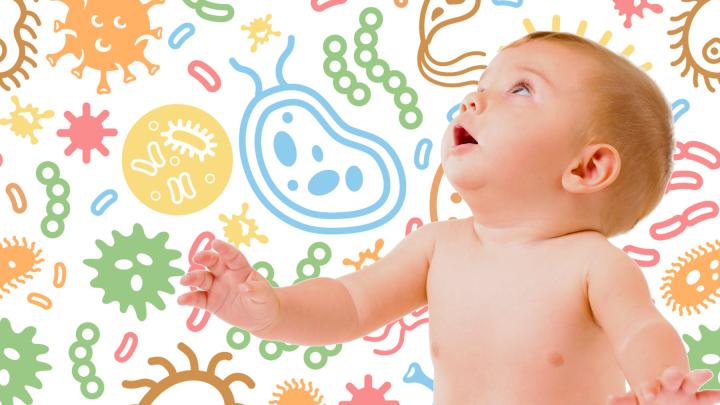Adding to recent research suggesting that the microbes in and on our bodies play a crucial role in human health—and that keeping the good bugs happy is as important as keeping the bad bugs out—Harvard scientists reported this week on how antibiotics affect infants’ gut microbiomes. The major findings are sobering, if not entirely unexpected: repeated exposure to antibiotics lowers the diversity and robustness of children’s gut microbes and leads to an uptick in antibiotic resistance genes.
The study, published in Science Translational Medicine, followed 39 Finnish infants for three years, beginning when they were two months old. Nineteen received no antibiotics at all; the others received between nine and 15 treatments, mostly for ear infections and upper-respiratory ailments. “This was a unique opportunity to study the natural trajectory of the microbiome in these kids,” says senior coauthor Ramnik Xavier, a gastroenterologist at the Broad Institute of MIT and Harvard, Massachusetts General Hospital’s Center for Computational and Integrative Biology, and Harvard Medical School. Despite the mountain of microbiome research accumulated during the past decade, “very few studies have been done in children,” Xavier explains, “especially longitudinal studies taking multiple samples over years.”
Arguably, those studies could be some of the most important: during a child’s first three years, the microbiome is dynamic, its composition still shifting and evolving, but after that, it’s basically set, Xavier says. The microbial makeup a child has at three is the one he or she will carry into adulthood. “So this is the most vulnerable period, during which messing with the microbiome could have longer-term implications.”
In the children with repeated exposure to antibiotics, Xavier and a dozen colleagues—including lead author Moran Yassour, a postdoc at the Broad Institute—found decreased numbers of some types of beneficial bacteria involved in training the immune system at an early age. Among them, a group of microbes called the Clostridium cluster, which helps promote regulatory T-cells that help modulate the immune system and stave off autoimmune disease.
Plus, Xavier adds, not only were there fewer species of microbes in the antibiotic-exposed children’s guts, but fewer strains of the species that were present: “just a less diverse microbiome, and less stable microbial communities. Having a diverse, rich, complex, microbial community is important for the immune education of the gut.”
Alongside that disruption, the researchers also saw a rise in the number of antibiotic resistance genes in treated children. Some of those genes, encoded on the microbial chromosome, peaked with exposure to antibiotics and then fell back. But other resistance genes, those encoded on more “mobile elements” outside the chromosome, did not decrease sharply at the end of the antibiotic course. Instead, they hung around for much longer—an unexpected and worrying discovery, Xavier says. “It clearly emphasizes the caution that needs to be followed in antibiotic prescriptions.…The spread of antibiotic resistance is a serious public-health issue.”
Examining other factors that influence infants’ microbiomes, the researchers also compared the microbial makeup of vaginally delivered children with those born by C-section, and of breast-fed versus formula-fed children. Previous studies have shown that C-section babies have fewer species of Bacteroides (important for immune function), and that formula-fed children lack some Bifidobacterium microbes (associated with infant nutrition and growth). This most recent study backs up those results, but also complicates the picture: all four of the Finnish infants born by C-section had a lower abundance of Bacteroides, but so did 20 percent of those delivered vaginally. Similarly, the researchers found decreased Bifidobacterium diversity even among some of the infants who’d been breast-fed. It’s not clear yet why, Xavier says.
The new study comes on the heels of another coauthored by Xavier, published in April in Cell. In that study, he and his colleagues followed more than 200 infants from three countries, and their findings bolstered the so-called hygiene hypothesis, developed to explain the recent explosion of allergies and autoimmune diseases. According to the hypothesis, growing up in a too-clean environment may actually be a bad thing, because exposure to germs in early life is necessary to help train the developing immune system. Focusing on Type 1 diabetes, Xavier’s Cell study examined the interplay between pathogens like E. coli and good bugs like Bacteroides that can be missing from a disrupted microbiome.
From here, plans for follow-up research point in multiple directions. Xavier would like to follow children for more than three years, to see how these early microbial changes manifest later on. Moran Yassour, the first author, has designed a study to track the microbiome during babies’ first two months, a critical period, absent from this study, in which the mother passes her microbiome to the child. In addition, the antibiotic resistance findings from the most recent study demand further investigation. “We’d like to figure out,” Xavier says, “how these antibiotic resistance genes come and go.”








